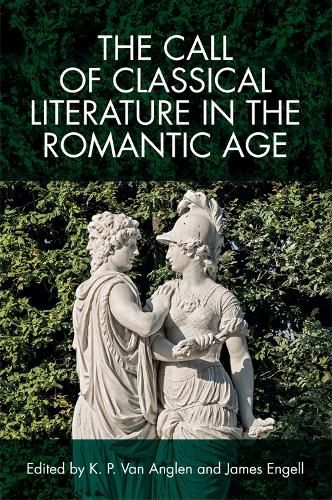Readings Newsletter
Become a Readings Member to make your shopping experience even easier.
Sign in or sign up for free!
You’re not far away from qualifying for FREE standard shipping within Australia
You’ve qualified for FREE standard shipping within Australia
The cart is loading…






Re-establishes the enduring presence and value of classical literature in the Romantic era
The Call of Classical Literature in the Romantic Age reveals the extent to which writers now called romantic venerate and use classical texts to transform lyric and narrative poetry, the novel, mythology, politics, and issues of race and slavery, as well as to provide models for their own literary careers and personal lives. On both sides of the Atlantic the classics–including the surprising influence of Hebrew, regarded as a classical language–play a major role in what becomes labeled romanticism only later in the nineteenth century.
The relation between classic and romantic is not one of opposition but subtle interpenetration and mutual transformation. While romantic writers regard what they are doing as new, this attitude in no way prompts them to abjure valuable lessons of genre, expression, and judgment flowing from the classical authors they love. This volume disturbs categories that have become too settled.
Key Features
Includes in almost equal proportion British and American authors and is transatlantic in scope Moves well beyond the five canonical British romantic poets, on whom considerable work has been done concerning their relation to classical literature Includes studies of African American and women writers
$9.00 standard shipping within Australia
FREE standard shipping within Australia for orders over $100.00
Express & International shipping calculated at checkout
Re-establishes the enduring presence and value of classical literature in the Romantic era
The Call of Classical Literature in the Romantic Age reveals the extent to which writers now called romantic venerate and use classical texts to transform lyric and narrative poetry, the novel, mythology, politics, and issues of race and slavery, as well as to provide models for their own literary careers and personal lives. On both sides of the Atlantic the classics–including the surprising influence of Hebrew, regarded as a classical language–play a major role in what becomes labeled romanticism only later in the nineteenth century.
The relation between classic and romantic is not one of opposition but subtle interpenetration and mutual transformation. While romantic writers regard what they are doing as new, this attitude in no way prompts them to abjure valuable lessons of genre, expression, and judgment flowing from the classical authors they love. This volume disturbs categories that have become too settled.
Key Features
Includes in almost equal proportion British and American authors and is transatlantic in scope Moves well beyond the five canonical British romantic poets, on whom considerable work has been done concerning their relation to classical literature Includes studies of African American and women writers